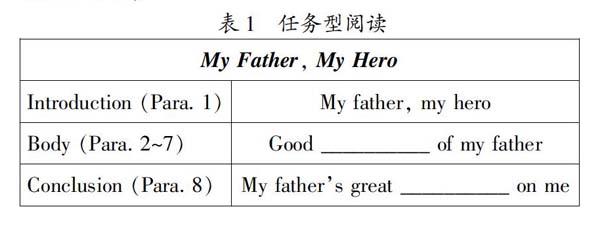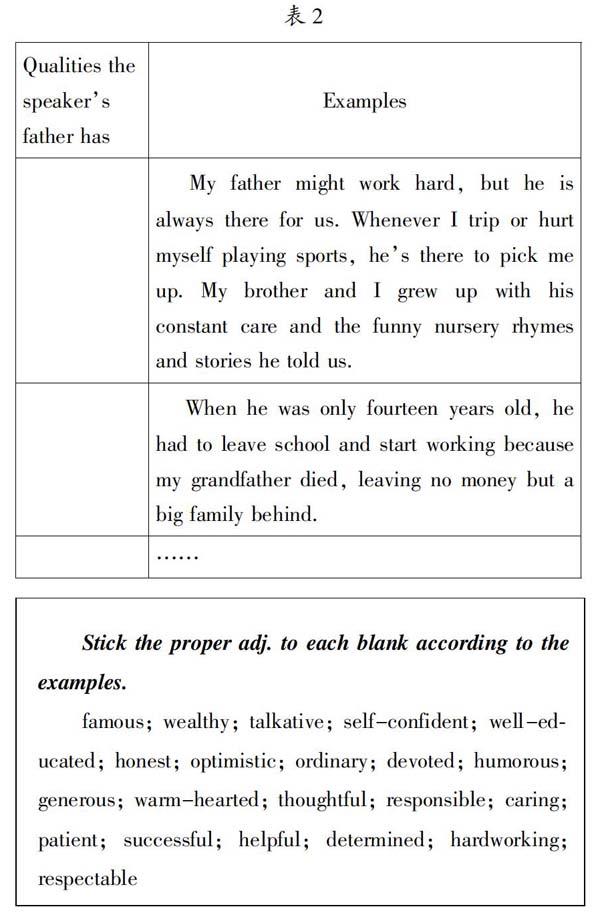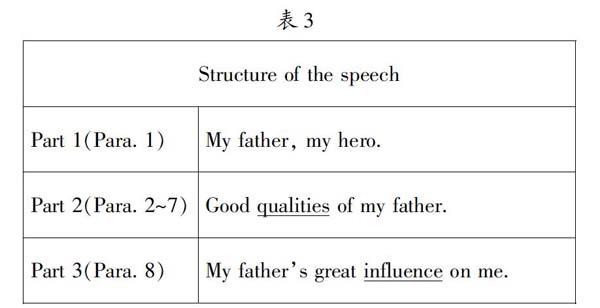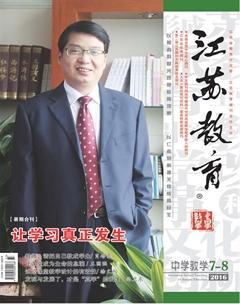实践读写结合教学模式,真正提高学生写作能力
【关键词】读写教学;读写结合;以读促写
【中图分类号】G633.4 【文献标志码】A 【文章编号】1005-6009(2016)33-0078-04
【作者简介】朱婧,江苏省苏州中学园区校(江苏苏州,215021)教师,二级教师。
【教学理念】
听、说、读、写这四种基本语言技能在语言学习和交际中相辅相成、相互促进。其中阅读作为一种语言输入形式,是理解技能;写作作为一种语言输出形式,是表达技能。两者都是高中英语教学中至关重要的环节,同时在高考试题中占有极大的比重。然而,很多教师因高中课堂时间的限制忽略了两者之间的关系,只是机械地训练学生的写作,使得语言的输入和输出活动出现在了两个不同的语境中,学生很难直接模仿并有效运用在阅读过程中,也无法有效地将输入语言转化为输出语言,而读写结合,以读促写则能把语言输入和输出两者整合在同一语境中,直接提供模仿并运用语言的机会,是改善高中生英语写作能力的有效方式。(凌勇,2016)
读写结合的教学指导思想是:将阅读与写作教学巧妙有机地结合在一起,确保阅读与写作相得益彰,阅读是出发点,写作是落脚点;通过阅读促进学生思考,夯实写作知识,培养写作能力与技巧,同时写作又强化、内化阅读所获取的知识和信息。(岑璐,2015)基本路径为“先读后写,由输入到输出,从理解到表达”。(刘美琳、王海玲,2014)
一、选择有示范性的高质量文本
在“读写结合,以读促写”的教学模式中,教师提供给学生的阅读文本应该和后续的写作在文章结构和主题思想上有较为紧密的联系,为写作起到示范的作用,这就要求教师选用语言规范优美、难度适中、层次分明、逻辑清晰并有一定思想的阅读文本。当学生在教师的指导下积累了一定量的语言表达和篇章结构时,写作就会变得顺理成章,水到渠成。
二、阅读教学活动的设计应为写作铺垫
读是基础,写是升华,读是为写服务的,因此教师在文本阅读的教学过程中可以围绕篇章结构、遣词造句和文体立意三个方面组织课堂活动,在帮助学生理解阅读文本的同时,为后续的写作做铺垫。
三、合理有效地引导学生做好预习和复习
在读写结合的教学模式中,读与写的时间分配应基本满足1∶1的比例,为了能够最大程度地提升读与写的质量,教师可以通过适当有效的预习作业,有意识地将部分阅读活动前移至课前,为课堂上的阅读理解做准备,同时在课后通过完成作业的形式让学生自行修改作文或者通过互评、讨论、分享等方式加强对课堂上语言输入的记忆和语言输出的运用。
四、写作任务的设计应贴近学生生活
为了改善学生作文的言之无物、空洞乏味、辞藻匮乏、立意不深的状况,教师在设计写作任务时应从阅读文本出发,注重与阅读文本的相关性,如体裁、结构、话题等,选择贴近学生生活的话题切入,通过对阅读文本的仿写、续写和改写等,提高学生的写作能力。
【教学设计】
一、教材分析
教学内容My Father, My Hero是一篇演讲稿,选自《牛津高中英语》模块十一第三单元的Project板块,这篇演讲稿在内容上不仅仅是简单的介绍一位父亲,而是集真实性和思想性为一体,对学生有一定教育引导意义,是能帮助学生形成正确人生观、世界观和价值观的文章。这篇演讲稿语言地道、自然,语境真实,语言输入量适当,难度适中,文字通俗易懂,结构清晰明了,有利于培养学生良好的语感,并能为学生的写作起到示范作用。
这篇文章虽然选自模块十一,但是无论从词汇量、句式还是内容上都符合课程标准七到八级的要求,能够帮助学生使用适当的语言形式表达观点、态度和情感,让学生学习和掌握常见语篇形式的结构和逻辑关系,帮助学生写出语义连贯且结构完整的短文,叙述事情和表达观点及态度,符合普通高中英语课程标准对高二学生的要求。
二、教学目标
1.理解文章主要内容,找出文中体现人物品质和特点的实例,并积累表现人物良好品质的形容词。
2.分析文章谋篇布局,建构同类型文章的结构,同时归纳好的词汇句式,为写作服务。
3.结合文章的立意,发现身边普通人所具备的良好素质,认识到每一个人都能成为英雄的事实,当堂完成相关写作。
三、教学重难点
如何有效地把握好读与写教学的衔接和统一以及如何合理地分配阅读和写作的时间。
四、教学过程
(一)Before class
请学生做好预习工作,要求学生在阅读过程中如遇到生词自行查字典并在文中标注;在预习后完成一个小型的任务型阅读(见表1);将学生分成6组,每组6人,请学生用他们心目中英雄的名字给自己的组命名。
Task-based reading (Fill in the blanks with one word each.)
(设计意图:通过预习,让学生熟悉文章内容和结构;通过分组及命名,让学生有了一次对心目中英雄的初步思考,这些工作均是为接下来的课堂教学做准备。)
(二) In class
【Step 1】 Lead-in
T:Do you love your parents?
T:Have you ever dreamt of being a son or daughter of a famous and wealthy person, such as Bill Gates, Jack Ma, and Mark Zuckerberg, etc?
S:...
T:As is known to all, no one can choose your parents. But if you were given a chance to choose a father, who would be your choice?Why?Here are two choices. Before you make a decision, I will give you more detailed information. Father A is the one possessing a smart SUV, a large villa, and graduated from Harvard University, while Father B has a relatively small car, an apartment, and left school when he was only 14.(在描述这两位父亲的同时,通过PPT向学生展示两组相关的图片。)
S A & B & C:...
T:...you know what, there is still someone whod like to be the son of Father B, and he even considers his father a hero. This person is the speaker of this speech. Do you know why?Please read the first paragraph as quickly as possible to find out the reason.
(设计意图:通过一个个开放性的问题,鼓励学生发表自己的看法,从而激起学生对这一话题的兴趣,同时在师生互动中自然且有效地导入本课的阅读话题——My father, my hero。)
【Step 2】 Reading comprehension
T:Why does the speaker consider his father a hero, according to the first paragraph?
S:...
T:...So you will find that the first paragraph is the introduction part of this speech, which introduces the topic to us, that is, My father, my hero. Is there any other reasons or examples that prove that the speakers father is the hero? Now please move on to the second part of the speech. This time you will be asked to do a group work. Each group will be provided with an envelope with your group name on it, inside which are a chart and some adjectives.(见表2) What you will be asked to do is that scan the whole speech to find out which adjectives are fit for the father, and which are not. And then stick the proper adjective to each blank. You will have 3 minutes to do this group work.
Stick the proper adj. to each blank according to the examples.
famous; wealthy; talkative; self-confident; well-educated; honest; optimistic; ordinary; devoted; humorous; generous; warm-hearted; thoughtful; responsible; caring; patient; successful; helpful; determined; hardworking; respectable
(After the group work)
T:Which adjectives are not fit for the speakers father?
S:Famous, wealthy, talkative, self-confident, and well-educated.
T:Since the speakers father is neither famous nor wealthy, can you find an adjective in this list to describe his father?
S:Ordinary.
T:Among the rest of the adjectives, why do you think the speakers father is humorous?
T:Where can you find that the speakers father is hard-working?
T: Do you know the meaning of the word “devoted”? Why do you think he is devoted?
T: Can you find an example to prove that the father is generous? Is there any other adjectives that have the similar meaning?
T:When it comes to warm-hearted and helpful, is there any other hints to show that his father is such a kind of person?
T:What about optimistic?
T:Now we know the reason why the speaker considers his father a hero is that his father has a variety of good qualities. What about the last paragraph? Please read the last paragraph and fill in the blank with one word.
(设计意图:这一教学环节的设计是让学生通过小组讨论以及回答问题的形式加深学生对阅读文本的理解并积累相关词汇,同时通过微型的任务型阅读来帮助学生更好地把握文章各个部分的大意,促进学生掌握文章结构,强化学生对语篇结构的意识,进而为接下来的写作做铺垫。)
【Step 3】 Guided writing
1. Free talk
T:From the speech, we can see that in the speakers eyes, his father is the hero. What about you? Who is your hero?
S:...
T:It seems that every one of you has a hero. But as is mentioned above, a hero doesnt have to be as great as Albert Einstein, or Steve Jobs, or Yang Liwei. He or she can be anyone around us: your father, mother, your teacher, your classmate, and even your dog, anyone as long as he / she can inspire you, anyone as long as you want badly to learn a lot from him or her, anyone as long as you show your love to him or her. Therefore, anybody can be a hero! Please write an article: _________, my hero.
(设计意图:通过这一组问答,能够自然地从阅读过渡到写作环节,同时在教师的引导下,学生会重新思考英雄的定义,并有意识地去发现身边普通人的好的品质。)
2. Guided writing
T:Before writing, I will provide you with some tips. 1) Try to use as many descriptive words as possible from the text. 2) Better adopt the hamburger structure. To make it clear, please tell me what you are supposed to write in each paragraph.
根据学生的回答,教师板书:
Para. 1 Who is your hero?
Para. 2 Why do you think so?
Para. 3 How does he / she influence you?
(设计意图:明确写作要求,再一次强调文章的框架结构。)
T:Lets see how to write it paragraph by paragraph. First of all, lets find out whether we can borrow some useful expressions from the speech. Since we are not allowed to write such a long article, how can we make the reasons and examples clear and brief? Take our speech as an example.
Find the useful sentence structures from the speech.
(1)我认为……是我生命中最重要的人
(2)我敬重……是由于……
(3)我从……那里学会了……和……,也学会了……,从……那里我学到了一个人真的可以发挥作用。
(设计意图:引导学生欣赏文中优美的句式表达,积累学生的写作语言,同时以阅读文本为例,以总分的结构用三个排比句将原文的中间部分缩写成一段,将事例和描述性词汇有机结合在一起,为学生接下来的写作做示范。)
3. Writing
Teacher:Now its your turn to write your hero.
__________, my hero
When it comes to hero, many will refer to some celebrities. But in my eyes, a hero can be ordinary. I consider _____ to be the most important person / companion in my life.
What I value about ________ is ________________.
Whenever (When/ Sometimes) _________________.
Whenever (When/ Sometimes) _________________.
Whenever (When/ Sometimes) _________________.
I have learnt from ____________ the need to be _____________ and _____________, and to ___________. From ________, I have learnt that one person can really make a difference.
在学生写完文章后,让他们在小组内交流并选出公认的那个英雄人物,然后在全班进行展示,教师做出相应的点评和指导。
(设计意图:通过这一形式能较好地降低写作的难度,通过学生自主写作、小组交流、学生展示、教师指导等环节完成写作任务,并引导学生运用阅读中所学词汇、句式表达及框架结构等来提升写作能力,真正做到读写结合,以读促写的教学目的。)
【Step 4】 Conclusion
T:Do you want to know who is my hero?
My hero
My hero is you
Your face is bright and shining
When you walk the way to your dream
Now you are fearless and determined
…
(设计意图:教师最后以自创的一首诗歌来告诉学生,他们正是教师心目中的英雄,从而将整节课推向高潮。)
【Step 5】 Homework
Polish your article.
(设计意图:课内外相结合,再次运用所学知识和技能优化写作,使阅读和写作两者统一。)
【参考文献】
[1]凌勇.读后续写的教学策略[J].中小学外语教学,2016(05):31-35.
[2]岑璐.例谈高中英语读写课教学中词汇处理的策略[J].中小学外语教学,2015(10).
[3]刘美琳,王海玲.高中英语读写课中写作活动的设计与思考[J].山东师范大学外国语学院学报:基础英语教育版,2014(06).

